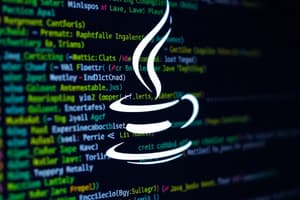Podcast
Questions and Answers
What is the purpose of marking a method as 'throws' a particular exception?
What is the purpose of marking a method as 'throws' a particular exception?
- It allows the method to catch and handle the exception internally.
- It forces any code calling the method to handle the potential exception. (correct)
- It automatically wraps the method in a try-catch block.
- It ensures that the method will never throw that particular exception.
What happens if an exception occurs in a try block and none of the catch blocks match the exception type?
What happens if an exception occurs in a try block and none of the catch blocks match the exception type?
- A default catch block is automatically executed.
- The program terminates immediately with an error message.
- The catch block of the parent method is checked for a match.
- The current method ends and execution jumps to the calling method. (correct)
Which statement best describes the purpose of a catch block?
Which statement best describes the purpose of a catch block?
- It allows a method to handle exceptions thrown by other methods.
- It defines the code to be executed if an exception occurs. (correct)
- It specifies the types of exceptions a method can throw.
- It prevents an exception from being propagated further.
What is the relationship between Errors and Exceptions in Java?
What is the relationship between Errors and Exceptions in Java?
Which type of exception is typically thrown for coding errors or invalid user input?
Which type of exception is typically thrown for coding errors or invalid user input?
If a method throws multiple exceptions, how can you handle them in the calling code?
If a method throws multiple exceptions, how can you handle them in the calling code?
What is the purpose of the 'finally' block in a try-catch statement?
What is the purpose of the 'finally' block in a try-catch statement?
Which statement is true about compile-time errors in Java?
Which statement is true about compile-time errors in Java?
What is the purpose of the 'throw' statement in Java?
What is the purpose of the 'throw' statement in Java?
Which exception type is typically thrown when accessing a file or network resource?
Which exception type is typically thrown when accessing a file or network resource?
Flashcards are hidden until you start studying
Study Notes
Exception Handling
- Exception handling is used to handle error conditions that occur during the execution of a method.
- There are five keywords used in exception handling: try, catch, throw, throws, and finally.
What is an Exception?
- An exception is an event that occurs during the execution of a program, interrupting the normal flow of the program's instructions.
- Exceptions are generated when a recognized error condition arises during the execution of a method.
- Java includes a system for running exceptions, tracking the potential for each method to throw specific exceptions.
Types of Errors
- There are two types of errors: compile-time errors and run-time errors.
- Compile-time errors are syntax errors identified by the Java compiler during compilation.
- Run-time errors occur during the execution of a program.
Exception Handling Mechanism
- The exception handling mechanism involves try, catch, and finally blocks.
- Try block: contains the "risky" code that may throw an exception.
- Catch block: used to catch and handle the exception.
- Finally block: used to guarantee the execution of code regardless of whether an exception is thrown.
Throwing Exceptions
- There are two ways to throw an exception: using the throw statement and using the throws statement.
- The throw statement is used to explicitly throw an exception.
- The throws statement is used to declare that a method may throw an exception.
Creating and Using Your Own Exception Classes
- You can create and use your own exception classes to handle specific exceptions.
Objectives
- Learn the exception handling mechanism.
- Write try-catch structures to catch expected exceptions.
- Use finally blocks to guarantee execution of code.
- Throw/throws exceptions.
Studying That Suits You
Use AI to generate personalized quizzes and flashcards to suit your learning preferences.




